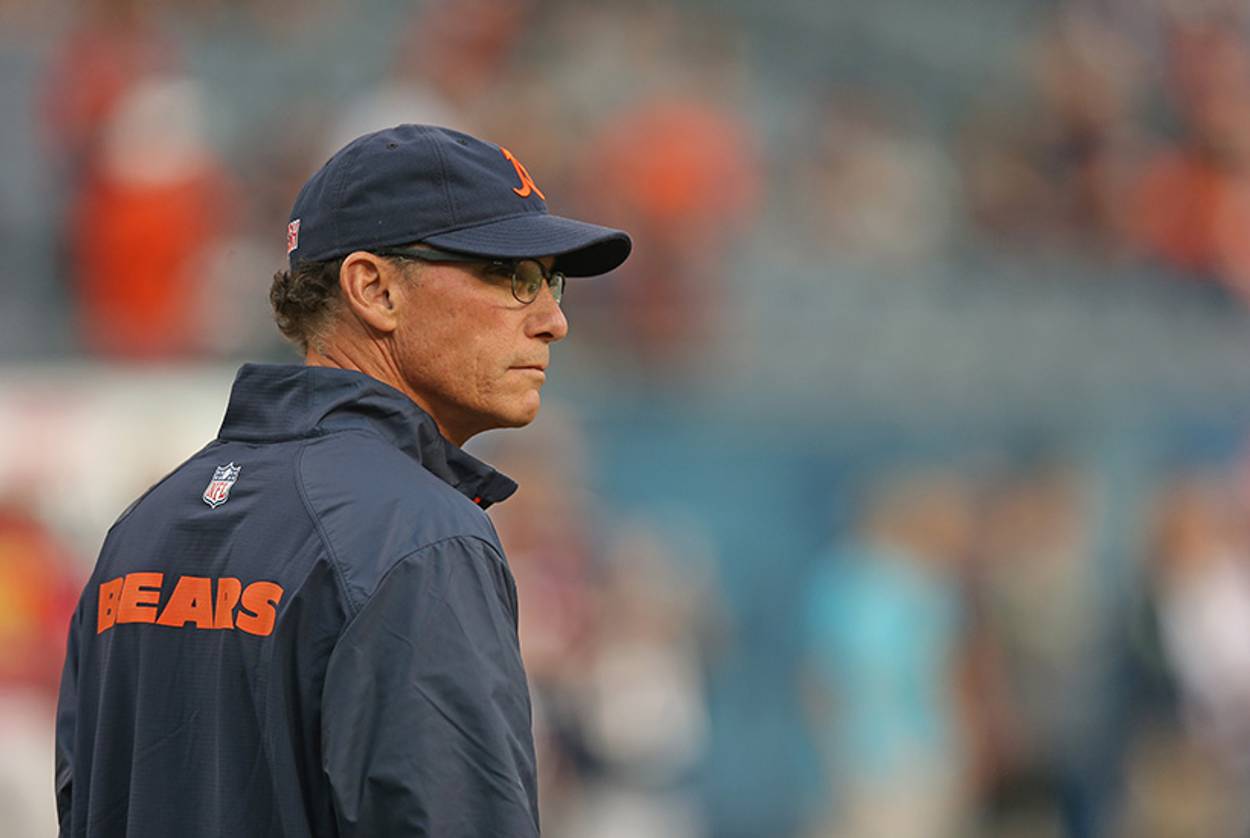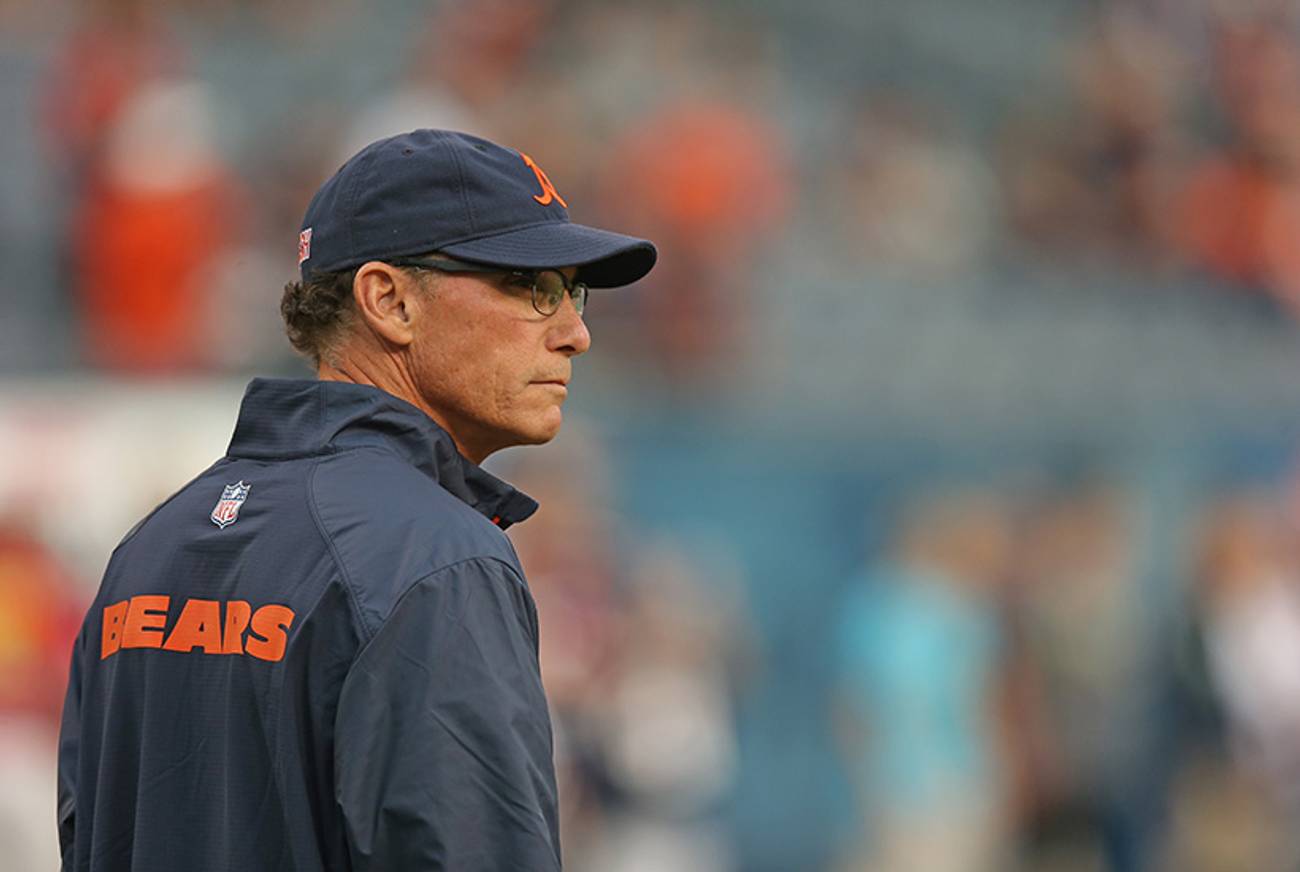For Long-Suffering Chicago Bears Fans, Hope For Victory Has a New Name: ‘The Rabbi’
Tonight, Coach Marc Trestman faces his first test as he sends his players to face the rival Green Bay Packers




I wish it weren’t true, but the one piece of relevant rabbinical wisdom ever dispensed my way was from a rabbi trying to get me to join his study group. When I told him that I couldn’t make it because I had tickets to see the Chicago Bears play, he forced a smile, let out a sigh, and said something that has since become not just my excuse to continue rooting for sports teams from my hometown, but also my mantra when the season ends: “Being a Chicago fan and being a Jew have a lot in common: You wait and you wait, and there’s a lot of suffering.”
Even thought I didn’t—and still don’t—want to admit he was right, it’s the truth. There was Michael Jordan’s Bulls, or the Blackhawks’ bids for greatness after decades coming up short, but then there are the Cubs: 100-plus years of wandering in the desert, searching for that elusive World Series championship, making them easily the saddest franchise in American sports. Yet I still find myself cheering for the Cubs long hot summer after long hot summer. Mine is a thankless faith, one that I’m told should finally pay off now that the team has hired former Red Sox Jewish wunderkind Theo Epstein to help do for Chicago what he did for Boston. They say Epstein could get us to the World Series, but I’m skeptical, and I have history on my side.
I tend to give up hope on the Cubs by the middle of the season, but with Chicago’s football team, the Bears, who usually play through the city’s hellishly cold winter, I try and hold out hope a little longer. And after more than 25 years of using the same formula of a powerhouse defense in their fruitless bid to re-capture the lightning in a bottle responsible for their 1985 Super Bowl win—with what football fans consider one of the, if not the, best single season team in the history of the sport—the Bears are finally taking some risks.
During the recent off-season, the Chicago Bears fired their coach since 2006, Lovie Smith, and hired Marc Trestman: formerly the Canadian Football League Championship-winning head coach of the Montreal Alouettes; NFL experience relegated to a short stint as an offensive coordinator; quarterback coach for several teams; and gifted with the ability to shape young sportsmen, earning him a reputation as something of a guru. And now, the guy I am going to place all my Super Bowl hopes and dreams on.
***
“The Rabbi!” a burly guy in a Walter Payton #34 jersey stood up and yelled as Trestman took the field as the Bears’ head coach for his first game, against the Cincinnati Bengals, on Sept. 8. I wasn’t watching from anywhere near Soldier Field; instead, I was at Canal Bar in Brooklyn, the weekly meeting place for Windy City expats like myself and the big guy chugging his afternoon High Life and screaming at the television. Against my better judgment, I decided to ask him where that nickname for the new coach came from.
“Because he’s Jewish,” he said, without looking at me, waving his hand in hopes of catching the swamped bartender’s eye.
Trestman is the rare Jewish football coach in a sport that hasn’t always elicited the same connection for American Jews that baseball has. He grew up in St. Louis Park, the same Minneapolis suburb that has, somewhat inexplicably, spawned a number of talented Jews, including the filmmakers Joel and Ethan Coen, the former comedian and now Sen. Al Franken, and New York Times columnist Thomas Friedman. Trestman was the Bears’ coach, therefore he was my coach; but he was also my people, which is something I honestly never thought I’d hear myself say.
We used to joke in my family that we were Jewish Chicago Bears fans. Getting ready for a Sunday game was more of a tradition than cleaning the house before Passover or making challah for Shabbat, and preparation for any given Bears game called for plenty of food and pre-game prayers that the team could deliver us to victory. Our devotion was thanks in large part to a player who helped revolutionize not only the quarterback position, but also the game itself: Sid Luckman, a Columbia-educated kid from Brooklyn who played during the Bears’ glory days of the 1940s, when they won four NFL championships.
Chicagoans whose ancestors saw Luckman play still regard the Bears as the city’s “Jewish team.” There have been others since—for the past two seasons, the Bears had offensive tackle “Bear Jew” Gabe Carimi before trading him to the Tampa Bay Buccaneers this past July, and there was the forgettable tenure of Rex Grossman who, thankfully, only had a name like a Jew, but in fact, wasn’t. But because Bears founder George Halas, in all his football wisdom, decided to take a chance on making Luckman the centerpiece of his team in 1939, it was the Bears—not the Cubs, the Bulls, the Blackhawks, or the White Sox on the South Side—who gave Chicago its greatest Jewish sports hero.
In a sport not traditionally filled with Jews on the field, Trestman’s position along the sidelines might seem like a better fit. The 57-year-old coach has his cap almost always affixed to his head above black glasses, and is small in stature compared to some of his offensive linemen, like the 6-foot-7 defensive end Julius Peppers. He’s a law-school graduate and a member of the Florida bar. Yet Trestman is one of just four Jews ever to take the helm of an NFL team. The most successful was Marv Levy, whose Buffalo Bills lost four straight Super Bowls at the start of the 1990s. It might seem like another stereotype, but the numbers don’t lie: The number of Jewish football fans dwarfs the number of fellow Jews that actually make it onto the field. That’s why if somebody says Trestman coaching one the sport’s marquee franchises isn’t that big a deal, they’re missing the point.
***
But once we move past the fact that Trestman is a Jew coaching the Chicago Bears, there’s the little matter of getting the team back to the Super Bowl, a place they haven’t been to since their Super Bowl XLI loss to the Indianapolis Colts in 2007 and haven’t won since the legendary 1985 team embarrassed the New England Patriots at Super Bowl XX. There were a lot of high hopes, big expectations, and a general fear of the unknown going into this season—a new coach bringing a whole new offensive-oriented game to the traditionally defensive-minded team, the team’s decision not to bring back its heart and soul, not only of that vaunted defense, but the entire team, by forsaking linebacker Brian Urlacher, and the little question of whether the on again/off again quarterback Jay Cutler would finally live up to his potential or find himself the victim of repeated sacks from opposing defenses, no thanks to a weak offensive line.
Up until mid-October, when the Bears took a 4-2 record to Washington to play the Redskins in Week 7, fans were hopeful. Cutler was connecting with his receivers, Brandon Marshall and Alshon Jeffery; running back Matt Forté was rushing for a lot of yards; the defense, while not as suffocating as in years past, was still taking the ball away from other teams on a pretty frequent basis. The Bears were playing well, but unlike seasons past, even when things were going well overall, the team this year, and especially Cutler, seemed poised and confident even when things started going wrong.
Unlike during the Lovie Smith era, when the stakes were high and the going was tough, the team hung in and either won or came close. Cutler wasn’t getting sacked repeatedly, and the team looked like they were getting comfortable. That is, until that day in Washington, when the Bears, who had already lost a few key players to injury, lost not only Cutler for four weeks, but also the team’s defensive leader, Lance Briggs, for six weeks. Yet the team almost came away with a hard-fought victory, despite a field like a war movie, bodies carted off to the sidelines one by one.
It won’t be easy. My team is playing without the two guys who lead their respective squads, but there’s something about this Bears team, and I think it all comes from Trestman. Fans aren’t cashing in their chips as the team hits the middle of the grueling season. There is something undeniably wise and calming about Trestman. Tonight he’ll lead the Bears to Lambeau Field in cold eastern Wisconsin, his first taste of the intense rivalry between the Bears and the Green Bay Packers (one of the two holiest days on a Bears fan’s calendar—the other being the second annual game played between the two teams). There are plenty of Old Testament comparisons you can draw: the hobbled Monsters of the Midway taking on the Packers, facing Green Bay’s star quarterback Aaron Rogers on his home turf without some of their most important players, but we won’t go there. Instead, we’re going to continue hoping that this is just another test, and that the coach the guy at Canal Bar calls “The Rabbi” can lead us to the football promised land.
***
Like this article? Sign up for our Daily Digest to get Tablet Magazine’s new content in your inbox each morning.
Jason Diamond is the literary editor of Flavorwire and founder of Vol. 1 Brooklyn. His Twitter feed is @imjasondiamond.
Jason Diamond is the literary editor of Flavorwire and founder of Vol. 1 Brooklyn. His Twitter feed is @imjasondiamond.